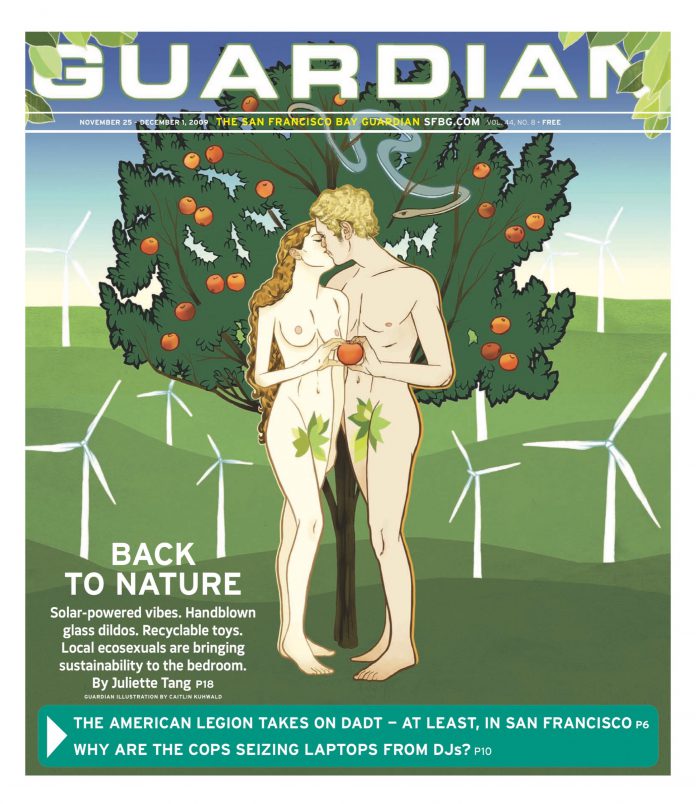arts@sfbg.com
MUSIC No one has ever heard the real Sa-Ra, declares Shafiq Husayn during an evening phone interview. And I believe him.
Formed in 2001 between L.A. musicians Om’mas Keith, Taz Arnold, and Husayn (a former rapper/producer in Ice-T’s Rhyme Syndicate crew), Sa-Ra Creative Partners is more powerful as a myth than an actual group. It emerged in 2004 as part of Kanye West’s ill-fated G.O.O.D. Music venture with Columbia, fomenting buzz for its never-released debut, Black Fuzz. After the group left the label, many fans falsely speculated that Sa-Ra had broken up, dissipating like a midnight dream.
Since then, Sa-Ra Creative Partners has issued two collections of songs, 2007’s The Hollywood Recordings (Babygrande) and this year’s Nuclear Evolution: The Age of Love (Ubiquity) The latter, a magnificent and powerful foray into drug and sex addiction, redemptive spirituality and love as a circadian rhythm, incorporates dozens of musicians both famous (Erykah Badu) and memorably eccentric (Rozzi Daime). Nuclear Evolution, patched together from songs recorded over the past several years, triumphs in spite of its sporadic assembly.
But Husayn, who sometimes refers to himself and Sa-Ra as third-person entities, says he doesn’t consider Nuclear Evolution a cohesive body of work. "Sa-Ra as a group has not released a debut album yet," he explains, perhaps perpetuating that myth himself. After all, wouldn’t a "Sa-Ra" album be the same as "Sa-Ra Creative Partners"? "We’re waiting for the right [distribution] situation to put it out. People are still sluggish, and not understanding." He adds, "What else do we have to do to show people that Sa-Ra is for real?"
So consider Husayn’s recent Shafiq ‘En A-Free-Kah a statement from a man in exile. He’s grateful to work with Plug Research, an L.A. indie best known for developing new artists. He’s also realistic about the small label’s ability to promote his music. "A lot of fans don’t even know that we have albums out," he rues.
Unlike the Sa-Ra Creative Partners collections, Husayn considers his solo debut a full-fledged philosophical treatise.
"’Kah’ in the ancient Kemetic language means spirit. So to be in the spirit of the Most High is infinite, it can’t be circumscribed by anything dealing with time and space. Thoughts originate in the spirit realm. They don’t originate on Earth," he explains. "So ‘en a-free-kah’ is a demonstration of using your higher self as a natural law. Or, as it is on Earth, shall it be in heaven, or as above shall be law, the unification of soul and mind, body and soul, all becoming one in a format of music. This is an album for the free nationals, meaning all in the international community who are not slaves, and when I say slaves, I mean not slaves in the mind, the ones that are open for a difference, for change. It is dedicated to the spirit of freedom."
It’s to Husayn’s credit that Shafiq ‘En A-Free-Kah sounds more fun than a history lesson. It sparkles with allusions to Loft-era disco and French coos ("Le’Star") and bass-bottom blues modernized with clipped electronic edits ("Lil’ Girl"). Protests against nuclear war ("Major Heavy") and fearless activism ("Rebel Soldier") play out against a fusillade of deep soul homage.
Sa-Ra may be the soul equivalent of DFA. While the home of LCD Soundsystem and Hercules and Love Affair rips off old Bohannon disco and Inner City techno tracks, Sa-Ra shamelessly references Sly & the Family Stone’s There’s a Riot Going On (1971, Epic). These reinventions soar through canny production tricks and fidelity toward the original’s bright futurism, editing out any postmodern commentary. Husayn’s "Changes," for example, revisits the same synthesized optimism elements as Stevie Wonder’s Talking Book (1972, Tamla/Motown).
But while DFA rules the indie-dance world through a distribution deal with international entertainment conglomerate EMI, Sa-Ra languishes, forced to license projects with modest albeit sympathetic companies. Husayn explains that his group is waiting to partner with a powerful company (ostensibly a major label) before it presents the full Sa-Ra experience.
"Any time Sa-Ra puts some music out, it should be a big deal," he says. "But you can’t know if it’s a big deal if you don’t even know it’s available." Well, now you know.

